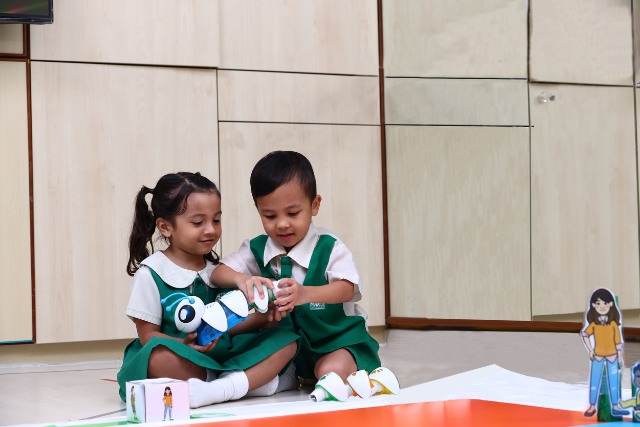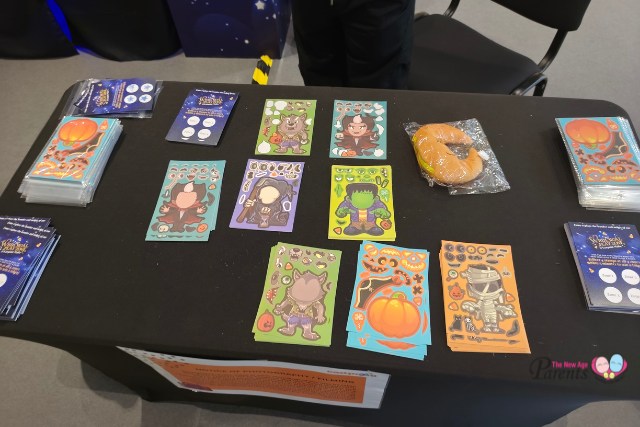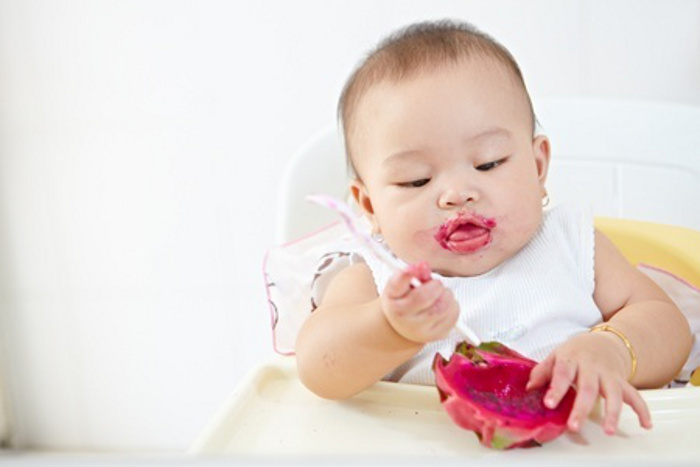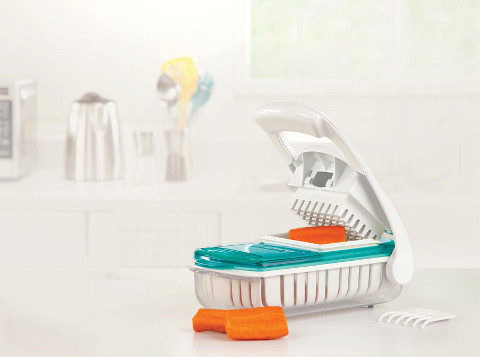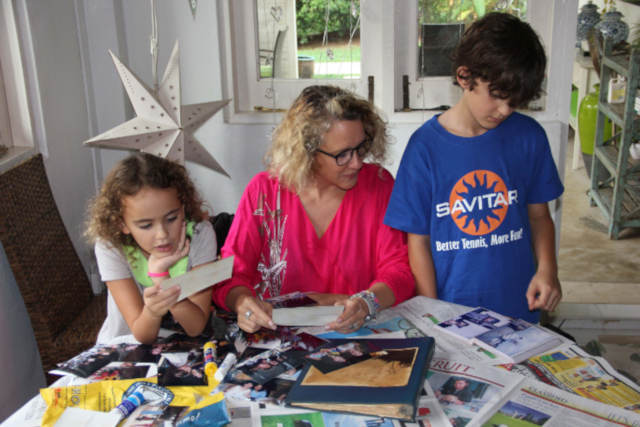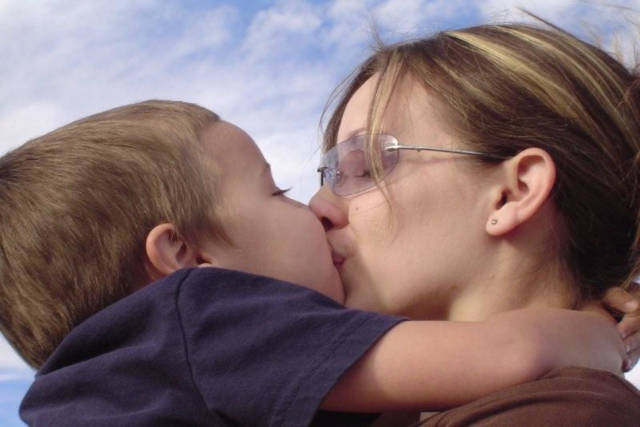During dinner, your baby suddenly stretches out her hand and tries to grab your spoon. Then she starts to wake up more frequently for milk at night. You start to think, “Is it time to start her on solid foods?”

Wait a minute. Before offering her the first spoon of solid food, take note of the following frequently-asked questions as this article shares what I have learned and some experiences with my 11-month old son.
When to Start Feeding Solid Foods?
The World Health Organization (WHO) and breastfeeding experts worldwide recommend that all babies be exclusively breastfed for the first 6 months of life. This generally means no cereal, juice or any other foods until your baby is about 6 months old. Some signs that your baby is developmentally ready are:
- Loss of tongue-thrust reflex (pushing food out of the mouth with her tongue)
- Sitting up without support
- Interested when you are eating
How to Get Started on Feeding?
Creating an interest in and a positive attitude towards taking solid foods is very important for your baby’s long-term development and health. Offer a small amount of food (about 1 tablespoon) and allow the baby to participate by holding the spoon or your little finger. My son is very enthusiastic about self-feeding and eats more when he helps to feed himself. Until today, he loves solid foods and enjoys meal-times.
⇒ Related Read: Top 10 Weaning Foods For Babies
Offering food also means that the baby needs not to eat or finish the food if she is not interested. Keep offering food on a daily basis and encourage her to eat.
Get an appropriate highchair or booster seat so that your baby can sit comfortably during meal-times. Personally, I help my boy to learn what he is having for his meals and minimise distractions (i.e. no toys and no T.V.) for a more pleasant feeding time and to inculcate healthy eating habits.
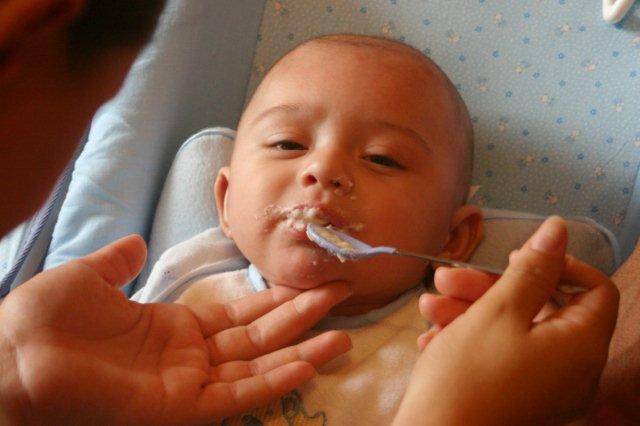
What Foods to Feed and How to Prepare Them?
To recognise a food that your baby may be allergic to, these are some points worth noting:
- Introducing or starting solid foods one at a time
- Introduce it in small amounts (about 1 tablespoon and increase it gradually) for at least 3 to 7 days in a row
- Recognise the possible signs of an allergic reaction (e.g. rashes, diarrhoea, gassiness)
I was advised to avoid offering baby the more allergenic foods until he is older. Examples of such foods are: wheat, orange and other citrus foods, dairy, eggs and tomatoes. You should also find out if there is a history of food allergy in your family when planning your baby’s menu.
Some common choices for first foods are baby rice cereal, pears, bananas, apples, avocados and sweet potatoes. I prefer organic produce which is free from artificial fertilisers and pesticides and always wash the produce well before cooking them.
My post-natal nurse taught me to cook all the foods, including fruits (with the exception of avocados), so that the baby is able to digest them more easily. In general, I steam the vegetables or fruits (with skin on) for about 20 minutes until they are soft, then remove the skin (if any), and mash them with a fork and through a sieve until they are fine enough for the baby to eat. No seasoning such as sugar or salt is needed.
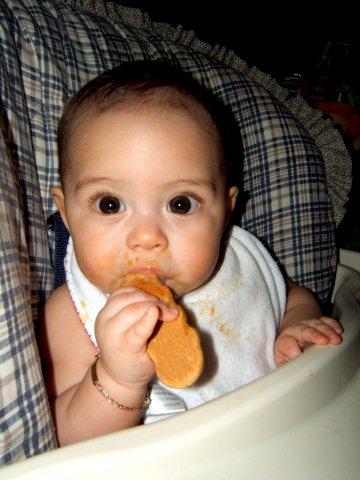
How Much to Feed?
Solid foods are meant to complement and not replace milk feeds before your baby’s first birthday. About an hour after her late morning milk feed, and when she is well-rested, you may offer her a suitable first food as lunch.
I chose baby rice cereal as the first food and found it easy to introduce my son to it by giving him half the usual milk feed and adding expressed breastmilk (EBM) to the cereal, which he accepted very well. A month later, he started taking dinner, and another month later, he began eating breakfast. In between the meals, he continued to have breastmilk.
Observe your baby and decide how much and how frequently to feed her solid foods. When she turns away, stops opening her mouth or fusses, it may be that she has eaten enough.
What Else Should I Note?
When you are unsure about areas related to introducing solid foods to your baby, always consult a qualified pediatrician. The following are some useful references:
- Kellymom, Solid Foods and the Breastfed Baby & Toddler
- World Health Organisation, Guiding Principles for Complementary Feeding of the Breastfed Child
- World Health Organisation, Guiding Principles for Feeding Non-Breastfed Children 6-24 Months of Age (2005)
- AskDrSears.com, Feeding Infants and Toddlers
By MieVee.
MieVee (previously known as ‘Mummy to Baby V’) is a first-time mother who relocated from Singapore to Malaysia. She has been cloth-diapering and breastfeeding her 11-month old son since he was born. Her blog, Mummy’s Reviews, provides reviews on products and services that her family has tried and aims to help parents make smart purchases.
* * * * *
Like what you see here? Get parenting tips and stories straight to your inbox! Join our mailing list here.
Want to be heard 👂 and seen 👀 by over 100,000 parents in Singapore? We can help! Leave your contact here and we’ll be in touch.













